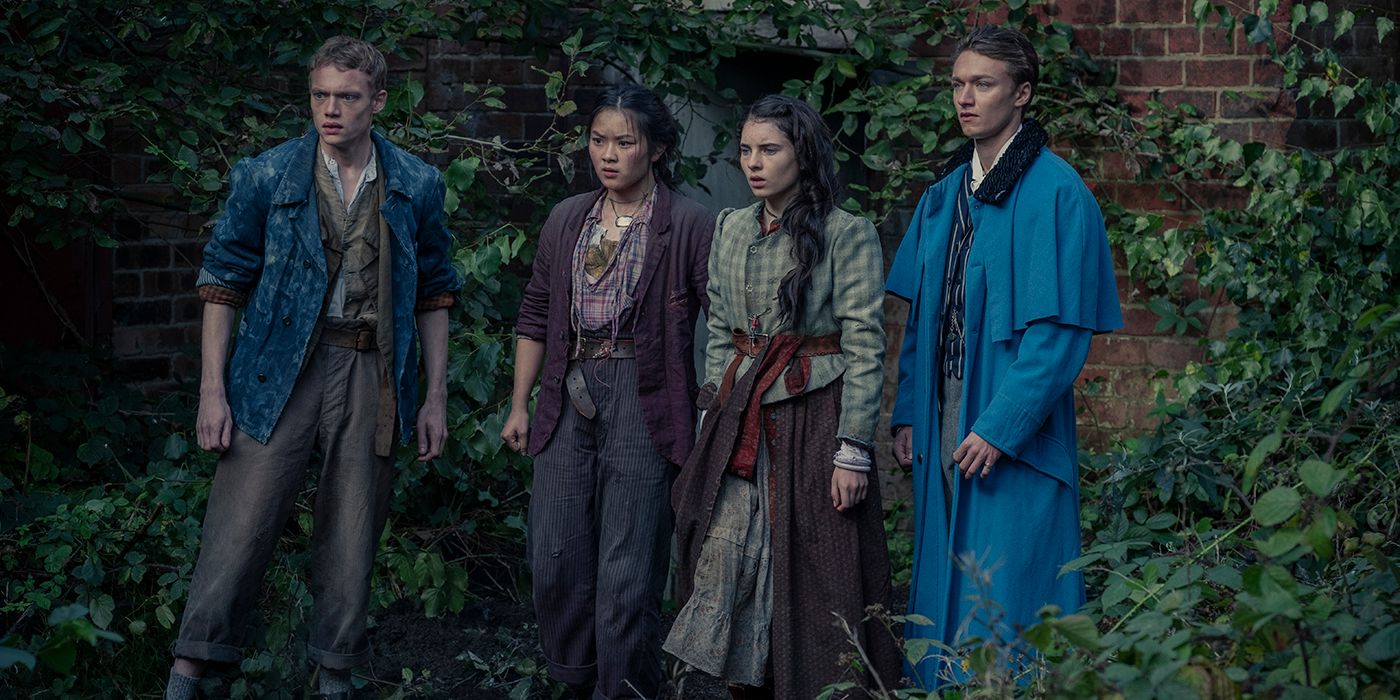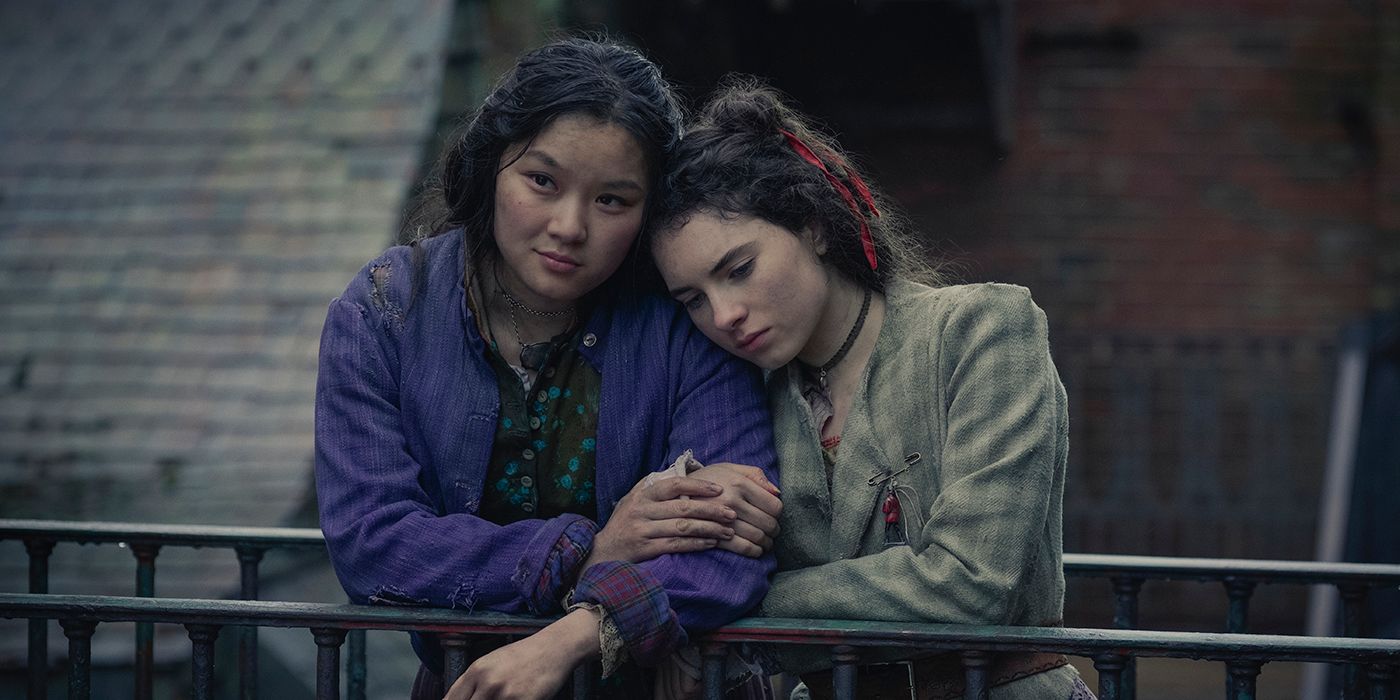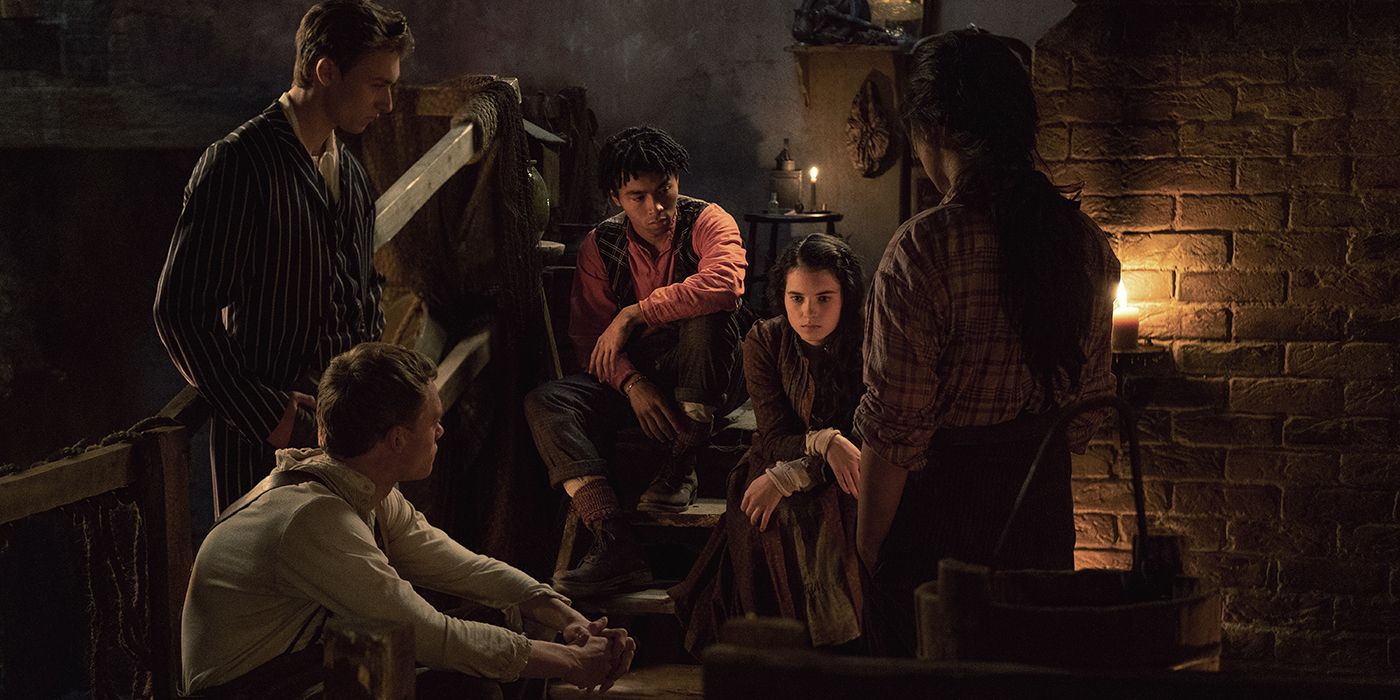The Irregulars is coming to Netflix on March 26, on the heels of the highly popular Enola Holmes. Both additions to the streaming catalogue reinvent the world of Sherlock Holmes with youth at the forefront, but while the film focused on a recently invented Holmes sister named Enola, the Baker Street Irregulars were a canonical group of street children that Holmes employed for a few of his cases.
Furthermore, the kids in question are quickly involved in supernatural events that take place in the Victorian setting. They eventually find themselves dragged into a deeper mystery than they could have ever imagined, with only each other for support. Bea (Thaddea Graham, The Letter For The King) is the leader of the crew, looking out for her younger sister Jessie (Darci Shaw, Judy) who happens to be frail but gifted. The newest member Leo (Harrison Osterfield) happens to be a prince in hiding, but is drawn more to the streets than the palace.
The young cast of the show spoke with Screen Rant about their knowledge of Sherlock Holmes, the bond between their characters, and the aspects that make them most excited about the first season.
What was your experience with Sherlock in general, and what research did you have to do into the concept of The Irregulars when you first started?
Thaddea Graham: I actually didn't have that much knowledge about the Sherlock Holmes world before we started. I knew who he was, and I think it's kind of ingrained in our culture to be aware of that world. But I hadn't really ever read the books or watched any of the series or the movies. So, I came to it quite fresh and knowing very little.
I think when we got given the scripts, it just felt like something entirely new. And I think what was really fascinating was that we see this very iconic world through the eyes of this young street gang. What I love about it is that these aren't your typical heroes. They don't have magical superpowers; they can't fly or anything. Jessie has something going on that I don't want to tell you about - but watch it, and you'll find out.
But I love that they're quite real people and, at times, they question what's going on. They go, "Hang on," when all this supernatural stuff goes in. "What the hell are we doing? Maybe we shouldn't be walking towards this. Maybe we shouldn't run towards the danger; maybe we should just go home and have a cup of tea," which I really like. Because I think it really roots us and grinds us in a very real world.
Darci Shaw: I did have an awareness of Sherlock Holmes. I was a bit of a fan of it before reading for the show, and I really enjoyed Benedict Cumberbatch and Martin Freeman's chemistry. That was a modern take on it, and I think our show is completely different to anything that's ever gone before it. And I think that's something that really drew me towards the project; that it was so fresh and new.
Even the way the characters speak to each other: it is set in Victorian London, but the language is very urban and kind of young, and I really loved that. I loved getting onto set and even seeing the costumes; the way that they were designed, and the silhouettes. Edward Gibbon, who designed them, was incredible. He pulled out these really lovely textures and colors, and it does make it really vibrant to watch on screen. So, I really hope people can accept this new world of Sherlock, this new set of characters, and enjoy watching.
Leo comes from very different elements than the Irregulars, or even from most Sherlock stories that we've read. What is it about this group that really draws him to it?
Harrison Osterfield: I think because Leo has been kept in the palace for such a long time and not really had met anyone his age, when he sees the Irregulars, he's like, "There's some people our age! It's so exciting."
But then he also sees how close they all are with each other, and how much love and history they have with each other. And he has never experienced that with anyone, really, except maybe his sister a little bit. But he sees that camaraderie, and it's something that he wants to explore. He wants to be a normal teenager, and he wants to explore love and friendship, and see what that's all about.
As soon as he encounters them, that's where he wants to spend all of his time. I don't think he realizes how dark and sinister it's going to get, but maybe he just thinks that's what London's like. And he's like, "Oh, this is just normal. Yeah, normal day-do-day of London. Maybe I should have stayed at home then."
Speaking of that camaraderie, you two are sisters but Bea is more the mothering type in the relationship. Meanwhile, Jessie is powerful, but that power brings pain as well. How do guys manage your relationship with the Irregulars and each other?
Thaddea Graham: I think from the moment we met, I kind of felt like I'd known Darci forever. We just got on so well, and we spent a lot of time together at work, of course, but also outside of it as well.
Darci lives in Liverpool, which is where we were shooting. I was staying away from home, and her family was just so welcoming and so warm, and we spent a lot of time at your house mostly just lying on the sofa and being like, "I'm really tired." But just having that time together to relax was really lovely.
Then I think for the relationship onscreen, Tom Bidwell, our creator, has just written that so beautifully. In a way, it's the little things that they said each other; we have little callbacks to what they used to do as kids. I think he's just built it so beautifully, and we didn't have to do a lot of work to tap into that, because it's all there.
I think it's a very human connection; that kind of love for someone and that protectiveness is something we can all relate to. I don't have siblings, but there are people in my life that I would do anything for, and who I would defend that to the last second. And I think everyone has people like that.
Darci Shaw: Yeah, I think Bea and Jessie's relationship is really special. They clearly have a really deep and strong connection, and as Thaddea was saying, It's the little things and little details like that. They have a little bit of an argument, and Jessie says something maybe a little bit too sassily. But by the next moment, it's kind of forgotten about. That is really what being sisters is about.
Tom created that so well on a script, and it was a joy to the play.
Thaddea Graham: I think also what has really connected those two is that they've had a very difficult life. They went to the workplace, they lost their mother when Bea was three and Jessie was a baby. That kind of pain really brings people together, and when the only other person in the world that you can trust is your little sister or your oldest sister, I think that just deepens the connection and makes you very guarded about anyone else trying to come in and be a part of that.
Not to spoil anything, but I think that the show reinforces that worldview, because even Leo has no authority figures that he can trust. But what themes did you personally pull from the story, or what resonated most?
Harrison Osterfield: I think everyone's resilience. Because the Irregulars aren't your regular heroes. They all have their insecurities and flaws and weaknesses at the start - or what they believe to be weaknesses, especially for Leo, where his illness has really defined him. He thinks, "That's about all I'll ever amount to."
But as the series goes on, they start trusting each other more and trying to open up to each other, and being vulnerable as well. It's such a powerful thing, once they realize that their weaknesses are what makes them unique, and once they can combine that together and have camaraderie, they realize that they're a good team and they can they can pretty much solve anything.
Darci Shaw: Yeah, I think there were a lot of themes that stood out to me. The show has a lot of different themes that we explore and, probably for me, I love the really light scenes, like the comedy elements. I really love that bit; I think it really lightens a whole piece and really makes you buy into their connection onscreen and the chemistry of the gang.
The five of them have a really cheeky and really funny little moments, or little nudges or little insults. I think it really does add to it, and it really makes you believe they've known each other for ages, and that they've accepted Leopold into the group as well. It's really sweet.
The Irregulars arrives March 26 on Netflix.



